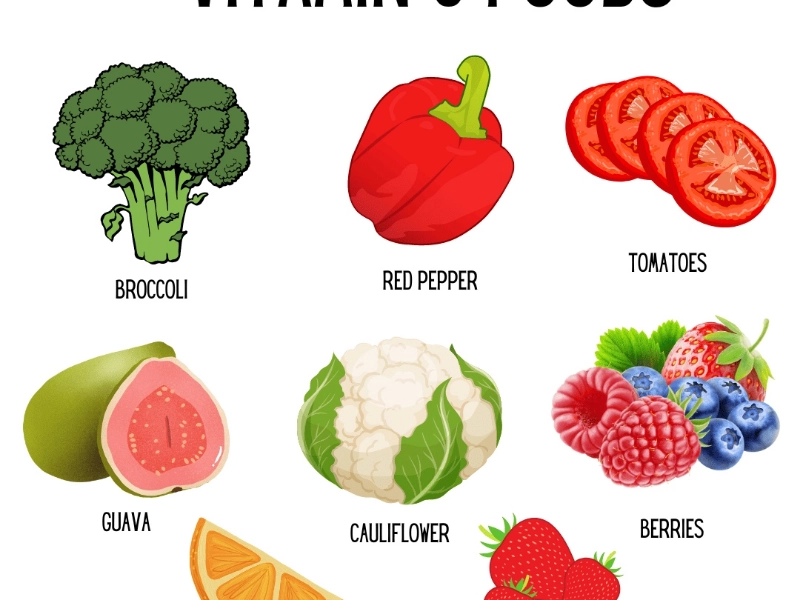Vitamin C: An Organic Mood Enhancer for Mental Health
A number of vitamins are important for mental health, and mood disorders may result from vitamin deficits. Depressive symptoms can be avoided by eating a balanced diet rich in fresh fruits and vegetables and taking supplements that improve mood. Among the minerals that are most commonly used to improve mood is vitamin C. In other well-conducted intervention trials and cross-sectional investigations, it has been associated with vitality and mood.
1. It Aids in Dopamine Production

2. It Facilitates Norepinephrine Production
 As a cofactor in norepinephrine metabolism, vitamin C is essential for regulating dopaminergic and glutamatergic neurotransmission. Additionally, it shields neurons from oxidative damage.
Research suggests that vitamin C is associated with a decrease in anxiety and sadness. It is also known to increase energy, which has the potential to improve mood.
Individuals with low levels of vitamin C may experience weariness or depression. According to one study, those with low vitamin C levels reported feeling happier after taking vitamin C pills.
This is believed to be the case because vitamin C inhibits the production of superoxide in response to dopamine and, in conjunction with norepinephrine, promotes the synthesis of dopamine. Additionally, it can stop acetylcholine and norepinephrine from degrading. By suppressing inflammatory cytokines, vitamin C has also been demonstrated to guard against the onset of some psychotic illnesses.
As a cofactor in norepinephrine metabolism, vitamin C is essential for regulating dopaminergic and glutamatergic neurotransmission. Additionally, it shields neurons from oxidative damage.
Research suggests that vitamin C is associated with a decrease in anxiety and sadness. It is also known to increase energy, which has the potential to improve mood.
Individuals with low levels of vitamin C may experience weariness or depression. According to one study, those with low vitamin C levels reported feeling happier after taking vitamin C pills.
This is believed to be the case because vitamin C inhibits the production of superoxide in response to dopamine and, in conjunction with norepinephrine, promotes the synthesis of dopamine. Additionally, it can stop acetylcholine and norepinephrine from degrading. By suppressing inflammatory cytokines, vitamin C has also been demonstrated to guard against the onset of some psychotic illnesses.
3. It aids in lowering inflammation.
 One well-known antioxidant with anti-inflammatory qualities is vitamin C. Moreover, it serves as a cofactor for the enzymes mono and dioxygenase, which by lowering the synthesis of reactive nitrogen and oxygen species might lessen oxidative stress. Because of its pleiotropic properties, vitamin C may improve mood by reducing inflammatory reactions in the body.
A cross-sectional study conducted in New Zealand utilising the Profile of Mood States (POMS) questionnaire revealed a connection between mood and vitamin C status as determined by plasma concentrations. The amounts of plasma vitamin C showed an inverse relationship with total mood disturbance (TMD) and all of the distinct POMS subscales, encompassing both happy and negative mood.
The findings imply that mental health professionals need to be aware of the negative psychological consequences linked to vitamin C insufficiency. Furthermore, medical professionals and consultation-liaison psychiatrists should be cautious when it comes to checking for vitamin C insufficiency in high-risk patient groups, such as those who have a poor diet or are prone to scurvy.
One well-known antioxidant with anti-inflammatory qualities is vitamin C. Moreover, it serves as a cofactor for the enzymes mono and dioxygenase, which by lowering the synthesis of reactive nitrogen and oxygen species might lessen oxidative stress. Because of its pleiotropic properties, vitamin C may improve mood by reducing inflammatory reactions in the body.
A cross-sectional study conducted in New Zealand utilising the Profile of Mood States (POMS) questionnaire revealed a connection between mood and vitamin C status as determined by plasma concentrations. The amounts of plasma vitamin C showed an inverse relationship with total mood disturbance (TMD) and all of the distinct POMS subscales, encompassing both happy and negative mood.
The findings imply that mental health professionals need to be aware of the negative psychological consequences linked to vitamin C insufficiency. Furthermore, medical professionals and consultation-liaison psychiatrists should be cautious when it comes to checking for vitamin C insufficiency in high-risk patient groups, such as those who have a poor diet or are prone to scurvy.
4. It Promotes Enhanced Vitality
 Through its antidepressant properties, which include blocking NMDA receptors and regulating monoaminergic activity, vitamin C may help lessen the symptoms of depression. By lowering inflammatory reactions linked to psychiatric diseases, it may also elevate mood.
In six-week intervention research, young men who consumed gold kiwi fruit, a natural source of vitamin C, reported increases in their general mood and a 32% reduction in depression symptoms. Additionally, their levels of focus and job absorption were enhanced. Supplementing with vitamin C also contributed to an increase in liveliness.
Passionflower is another herb that has been demonstrated to improve mood by reducing stress and anxiety. It is a well-liked herbal treatment that encourages relaxation and mental calmness. Another popular herbal remedy that helps to stabilise mood is chamomile, which works by preventing excitatory signals in the brain. A popular adaptogen that is thought to improve mental clarity and alertness is ginseng. Often, dietary supplements combining these herbs are intended to offer all-encompassing mood support.
Through its antidepressant properties, which include blocking NMDA receptors and regulating monoaminergic activity, vitamin C may help lessen the symptoms of depression. By lowering inflammatory reactions linked to psychiatric diseases, it may also elevate mood.
In six-week intervention research, young men who consumed gold kiwi fruit, a natural source of vitamin C, reported increases in their general mood and a 32% reduction in depression symptoms. Additionally, their levels of focus and job absorption were enhanced. Supplementing with vitamin C also contributed to an increase in liveliness.
Passionflower is another herb that has been demonstrated to improve mood by reducing stress and anxiety. It is a well-liked herbal treatment that encourages relaxation and mental calmness. Another popular herbal remedy that helps to stabilise mood is chamomile, which works by preventing excitatory signals in the brain. A popular adaptogen that is thought to improve mental clarity and alertness is ginseng. Often, dietary supplements combining these herbs are intended to offer all-encompassing mood support.









